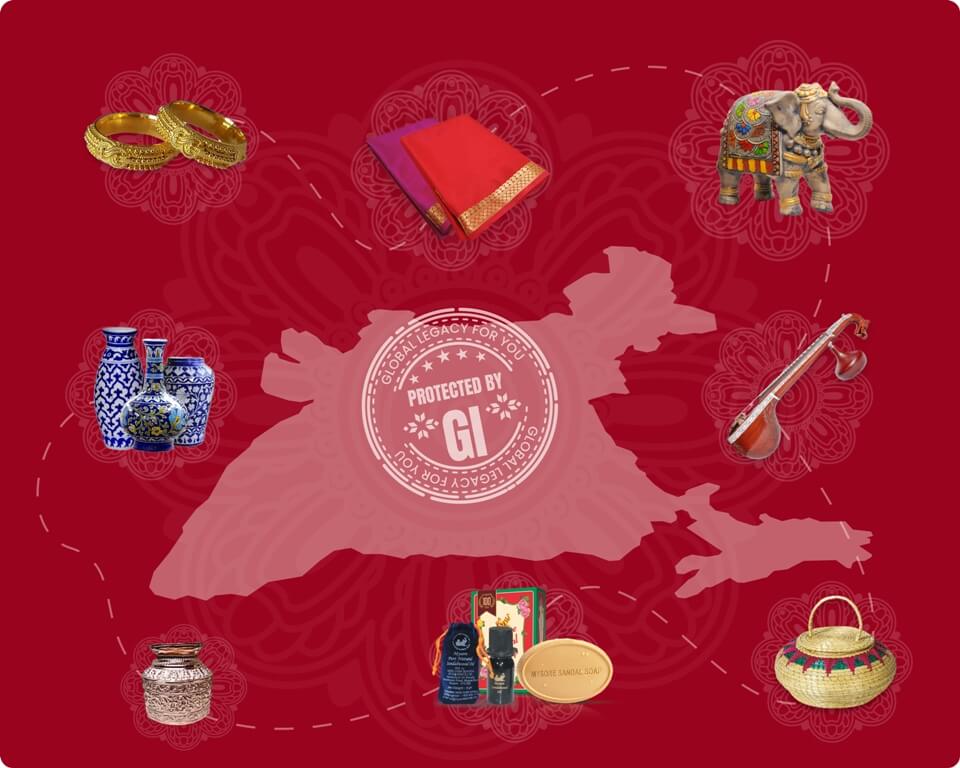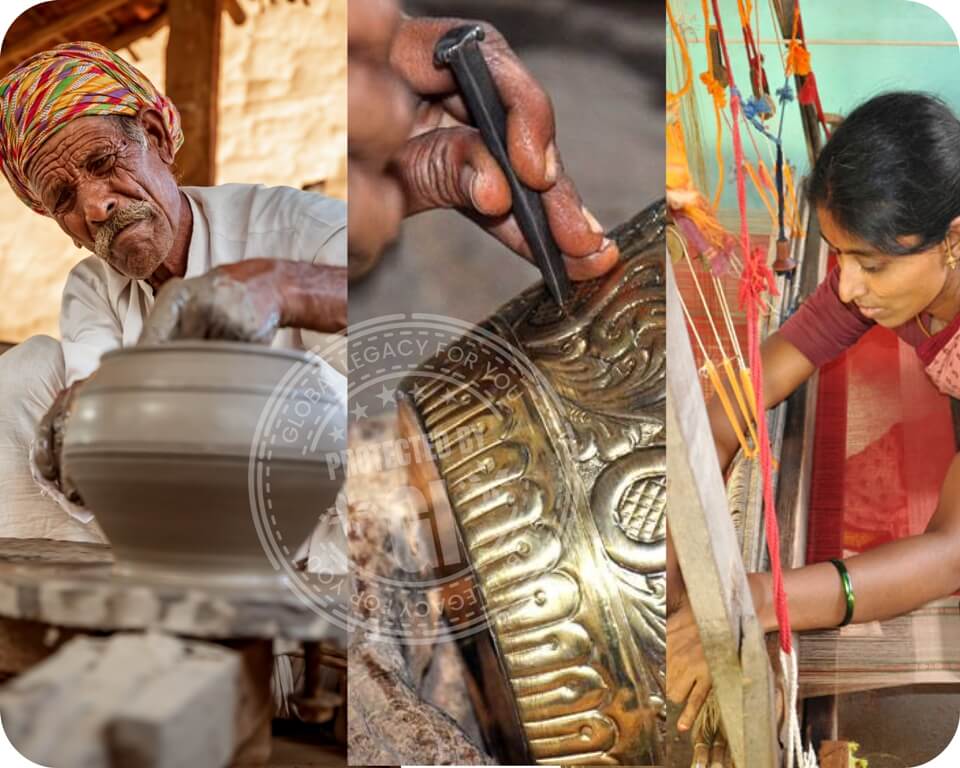
Leveraging Indian Geographical Indications for Sustainable Development: Case Studies and Best Practices.
India is a country that is home to a rich and diverse cultural heritage. One aspect of this heritage is the country's vast array of unique and traditional products that are closely linked to specific regions and communities. These products are protected by the Indian government under the Geographical Indication (GI) system, which aims to preserve the identity and integrity of these products and promote their economic development.
Geographical Indications (GIs) are signs that are used on products that have a specific geographical origin and possess qualities, reputation, or characteristics that are essentially attributable to that origin. In India, the GI tag is granted to various products such as handicrafts, textiles, agricultural products, and food items. By obtaining a GI tag, producers of these products can differentiate their products from similar products produced elsewhere, thus enhancing their market value and competitiveness.
The GI system has played a crucial role in promoting sustainable development in India. By recognizing and protecting traditional knowledge and local resources, the system has empowered local communities and encouraged them to preserve their cultural heritage. In this blog, we will explore some case studies and best practices of leveraging Indian Geographical Indications for sustainable development.
Darjeeling Tea
Darjeeling Tea is one of the most famous tea varieties in the world. Grown in the hilly region of Darjeeling in West Bengal, this tea has a unique flavor and aroma that is the result of the region's unique climatic and soil conditions. To protect the authenticity of Darjeeling Tea and prevent its misuse, the Indian government granted it a GI tag in 2004.
The GI tag has helped in the sustainable development of the Darjeeling Tea industry in several ways. Firstly, it has prevented the production of fake Darjeeling tea, which was previously a significant problem in the market. The GI tag has also ensured that the tea is grown using traditional methods, without the use of chemical fertilizers and pesticides, thus promoting sustainable agriculture. Additionally, the GI tag has given the local farmers a sense of pride in their product and encouraged them to maintain the high-quality standards of Darjeeling tea.
Nagpur Orange
Nagpur Orange is a unique variety of orange that is grown in the Nagpur region of Maharashtra. This orange is known for its juicy texture, sweet flavor, and rich aroma, which are the result of the region's unique soil and climatic conditions. In 2014, Nagpur Orange received a GI tag, which helped in promoting its sustainable development.
The GI tag has helped in the sustainable development of Nagpur Orange in several ways. Firstly, it has prevented the production of fake Nagpur oranges, which was previously a significant issue in the market. Secondly, the GI tag has protected the traditional farming methods used in Nagpur, which involve minimal use of chemical fertilizers and pesticides, thus promoting sustainable agriculture. Lastly, the GI tag has increased the market value of Nagpur Orange, which has encouraged local farmers to continue producing this unique variety of orange.
Kullu Shawl
Kullu Shawl is a traditional woolen shawl that is produced in the Kullu region of Himachal Pradesh. These shawls are known for their intricate designs and high-quality weaving techniques. To protect the authenticity of Kullu Shawl and promote its sustainable development, the Indian government granted it a GI tag in 2005.
The GI tag has helped in the sustainable development of the Kullu Shawl industry in several ways. Firstly, it has prevented the production of fake Kullu shawls, which was previously a significant problem in the market. Secondly, the GI tag has protected the traditional weaving techniques used in Kullu, which involve manual spinning and weaving, thus promoting sustainable livelihoods for local weavers. Lastly, the GI tag has increased the market value of Kullu Shawl, which has encouraged weavers to continue producing this traditional product.
Case Study 4: Mizo Chilli
Mizo Chilli is a unique variety of chili grown in the Mizoram region of Northeast India. These chilies are known for their intense heat and distinct flavor, which are the result of the region's specific soil and climatic conditions. In 2020, Mizo Chilli received a GI tag to protect its authenticity and promote sustainable development. The GI tag has helped in preventing the production of fake Mizo Chilli and has encouraged local farmers to continue producing this unique variety of chili.
To fully realize the potential of GIs, it is important to follow certain best practices to leverage GIs to their full potential and development.
- Firstly, it is important to involve and empower local communities in the GI registration and certification process. Local communities possess valuable knowledge and practices related to the products, which should be taken into account during the registration and certification process. This helps to ensure that the GI registration and certification process is transparent, participatory, and inclusive.
- Secondly, it is important to promote sustainable production practices and ensure that the GI products are produced in an environmentally friendly and socially responsible manner. This helps to preserve the local environment and biodiversity, while also ensuring that the production process benefits local communities.
- Thirdly, it is important to create awareness and promote the value of GI products among consumers. Consumers need to be made aware of the unique qualities and characteristics of the GI products, as well as the cultural heritage and environmental benefits associated with them. This helps to increase the market value of the products and create new opportunities for local communities.
In conclusion, leveraging Indian Geographical Indications for sustainable development can have a positive impact on local economies, cultural heritage, and biodiversity. Through the protection and promotion of GI products, India can boost local economies, create jobs, and preserve cultural heritage and biodiversity. By following best practices and involving local communities in the process, we can ensure that the benefits of GI products are shared by all, creating a more sustainable and equitable future. So, let's support and take part in these activities, promoting and protecting the cultural heritage and biodiversity of India for generations to come.
Leave A Comment
Your email address will not be published. Required fields are marked *

 INR
INR USD - $
USD - $
 CAD - Can$
CAD - Can$
 EUR - €
EUR - €
 GBP - £
GBP - £
 SGD - S$
SGD - S$
 AUD - A$
AUD - A$
 MYR - (RM)
MYR - (RM)


0 Comment